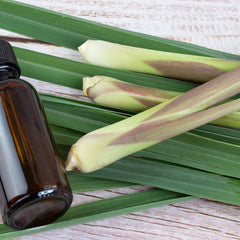Citronella Essential Oil
A Crisp Citrus Boost for Bug-Filled Days
Citronella, Cymbopogon winterianus, oil is steam distilled from the leaves of a grass plant that resembles and is closely related to lemongrass.
There are two species of citronella plants from which the oil can be extracted, Cymbopogon winterianus, also called Java citronella, which is a bit sweeter and more lemony, and Cymbopogon nardus--both of which are native to Southeast Asia and give off a lemony scent as the natural citronella oil evaporates from their leaves.
Rich in natural antioxidants and plant compounds, citronella oil has long been used in Asian folk medicine to help ease inflammation, calm redness, soothe rashes, reduce pain, and support overall skin comfort. When diluted into a massage oil, its warming nature can help enhance circulation, making it a favorite for soothing stiff or arthritic joints.
Best known as a natural insect deterrent, citronella is one of the most trusted botanical ingredients for bug-repellent sprays, balms, and outdoor products. It was officially registered as a plant-based mosquito repellent in the U.S. back in 1948, and today the EPA classifies it as a gentle, low-toxicity “biopesticide.” For effective protection, reapplication is necessary — like most natural repellents, it evaporates faster than synthetic alternatives.
Aromatherapy Properties: Bright, citrus-fresh, clean, slightly sweet, citronella’s crisp aroma is uplifting and energizing, helping refresh the mind, boost mood, and ease fatigue or tension. It is most famously used for repelling insects, but is also appreciated for promoting clarity, relaxation, and a lighter emotional state.
Interesting to Know
As with all essential oils, citronella is not a single compound — it’s a blend of naturally occurring molecules, primarily geraniol, citronellal, and citronellol, which also appear in rose, lemongrass, and geranium oils.
The common "mosquito" plant found in nurseries in the U.S. is not a true citronella plant. It is actually a strongly scented geranium plant, Pelargonium citrosum. You will notice that its leaves resemble those of a geranium, not lemongrass.
Pregnancy and Children: We do not provide information on the safety of essential oils during Pregnancy or for use in Children because the available information is very ambiguous and often contradictory. If you’re interested in using essential oils during pregnancy or with young children, please do your own research and consult your doctor, midwife, or health care professional before use.
Precautions: If you are pregnant, nursing, taking medication, have a medical condition, or have any medical concerns regarding yourself or your family consult a qualified, licensed health professional prior to use. For external use only. Keep away from the eyes and mucous membranes. Keep out of reach of children.






